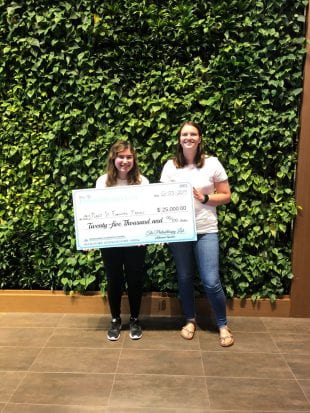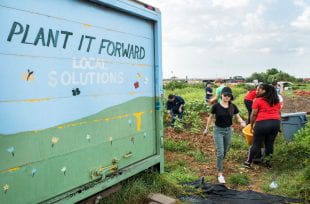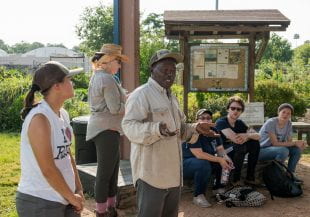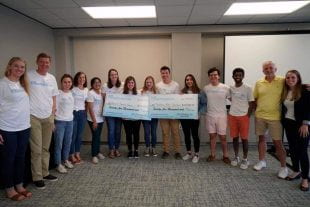Rice’s Giving to Learn course isn’t just a classroom exercise. Students enrolled in it learn about philanthropy by giving real money to real nonprofits.

Lindsey Josephs and Thresa Skeslien-Jenkins won $25,000 in grant money for Houston nonprofit Plant It Forward Farms at the 2019 Philanthropy Lab annual conference.
Nonetheless, when Giving to Learn students awarded $10,000 in grant money to Plant It Forward Farms, a local nonprofit that assists newly arrived refugees in establishing their own urban farms and selling their produce, Liz Vallette was surprised and thrilled.
“There were a lot of impressive groups in the room, so that was really exciting,” said Vallette, president of Plant It Forward, one of nine Houston groups that received a total of $50,000 in grants at an April 18 ceremony at the Glasscock School of Continuing Studies.
But the students in the Giving to Learn course weren’t done yet.
By summer’s end, they’d won an additional $25,000 for Plant It Forward at The Philanthropy Lab’s annual conference.
For the past three years, Rice has partnered with The Philanthropy Lab, a Fort Worth-based organization dedicated to supporting philanthropy education at universities. Together, they offer an annual course in charitable giving that culminates in the distribution of real money to local organizations. Taught by Vida Avery through Rice’s Center for Civic Leadership, the class gives students an understanding of the history, philosophy and practice of philanthropy.
After each year’s course, one nonprofit is chosen by the students to be represented at the annual conference in Dallas over the summer. There, two students from each partner university have the chance to win even more grant money for their chosen organization.
Competing against students from Harvard, Stanford, Northwestern and 11 other universities across the nation, Duncan College junior Lindsay Josephs and Thresa Skeslien-Jenkins ’19 spent three days pitching Plant It Forward and persuading their peers to award it a large chunk of the conference’s $150,000 purse.
Their in-depth knowledge and passionate presentations about Plant It Forward ultimately won over their fellow ambassadors at the conference, earning Plant It Forward a $25,000 grant.
“The magic still hasn’t worn off,” said Skeslien-Jenkins, who volunteered to attend the summer conference as an ambassador alongside classmate Josephs.
Although she was already working after her graduation as a business analyst at Deloitte Human Capital, Skeslien-Jenkins wanted not only to continue advocating for Plant It Forward, but also to continue her work as a budding young philanthropist.

Rice students also work with at Plant It Forward Farms through other CCL-led projects throughout the year. (Photo by Tommy LaVergne)
“I am a low-income student who came to Rice through the QuestBridge program,” said Skeslien-Jenkins, who graduated this year with degrees in political science and sociology. “So I’ve always been interested in philanthropy, because I wouldn’t be at Rice without the amazing scholarships they give out.”
Her previous internships at nonprofits showed her how difficult it was to obtain grant money in time to line up with necessary projects or attract donors to niche organizations. And helping raise money for the Rice Annual Fund her senior year, during which the Senior Class Giving Campaign for Class of 2019 hit record goals, taught her the importance of setting a high bar when it comes to advocating for your group.
“I would like to be on a nonprofit board one day and help from the development side like I experienced at Rice, to be able to channel funds to places that need it the most,” Skeslien-Jenkins said. “Having that experience in college was really important.”
She was also attracted to the course because of the opportunities she knew lay ahead of her after graduation.
“We’re all incredibly privileged people and we’re all going to make money, so how do we make strategic decisions about where to invest that money?” Skeslien-Jenkins said. Giving to Learn teaches students how to make those kinds of decisions intelligently, from vetting nonprofits and their work to making the maximum impact with your charitable donations.
“My biggest misconception going into the course was that it’s best to donate smaller amounts of money to as many organizations as possible,” said Josephs, who’s majoring in psychology and minoring in business and sociology.

Many of the Plant It Forward farmers, including Materanya “Pierre” Ruchinagiza, came to Houston from the Democratic Republic of Congo. (Photo by Tommy LaVergne)
“It’s best to select one, two or three issues that are really important to you, then support those,” she said. “And we often view money as the best way to help out a nonprofit. But in reality, I think dedicating your time is the most important gift you can give.”
Like Skeslien-Jenkins, Josephs is earnest about her passion for philanthropy. It’s a priority she said her parents helped instill in her from a young age. And through a brother with autism, she said, she’s witnessed firsthand the educational barriers he’s faced as a student.
“I’ve been blessed in so many different ways,” Josephs said. “As a Rice student, I believe that I have a moral obligation to help other students obtain access to the resources that are readily available to me. It’s important to use what I have and my own privilege to help open doors for others.”
Josephs enjoyed the experience so much, she’s returning her junior year as a grant evaluator to assist other students in the next Giving to Learn course. And Vallette has invited her and Skeslien-Jenkins to tell the story of their $25,000 victory to the Plant It Forward board of directors in September.
That money, Vallette said, will be used to fund a long-needed food hub for Plant It Forward. The hub will allow farmers to store and distribute their produce from a central location, providing refrigeration and an extra level of quality control before the food heads out to farmers markets and restaurants across the city.
“The students did a ton of work and they are really incredible ambassadors for us,” Vallette said.

Rice students compete with fellow “ambassadors” from Harvard, Stanford, Northwestern and 11 other universities across the nation at the annual conference.
The sorts of high-level questions Josephs and Skeslien-Jenkins had to answer about Plant It Forward at the Philanthropy Lab conference in order to secure that $25,000 were the same important issues the board of directors addresses regularly, Vallette said.
“The detail that they were learning was so impressive that I made a note to myself that they need to come present this to the board,” Vallette said. “(The board) should be able to speak at this level of detail and answer the same things they’re asking questions about.”
They’re also the kind of questions others should ask before donating their time or money, said Vallette, a U.S. Army veteran who’s spent her entire post-military career in the nonprofit world.
“It’s a pretty high-level assessment of a nonprofit that you don’t see every day,” she said of the in-depth research done by the Rice students.
“They’re basically future board members,” Vallette said. “We need to hurry up and get them on the board now.”

